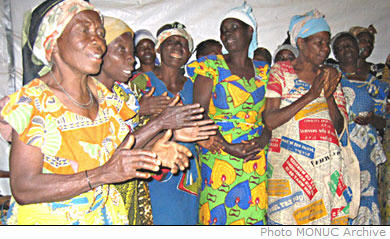In the lead up to International Woman's Day, celebrated on 8 March each year, a Parity Observatory in the DRC was launched, which has the role of ensuring a permanent follow-up on the progress of parity for women at the social, economic, and policy levels in the DRC, while supervising and stimulating implementation of effective gender equality.

The NGO Parity Observatory, through its principal instrument -www.observatoiredelaparite.org- wants to have effective follow up and evaluation of the impact of policies aimed at reducing the disparities between men and women in the DRC.
?One can find on the site the statistics on the participation of women in political life, and more precisely if women have the same possibilities as men to occupy positions of responsibility,? explained the director Ms. Espérance Mawanzo.
According to its website, in the national institutions, there are six women (13%) among the 45 members of government, while in the parliament, women count for 55 out of 653, or 8.5%. In addition, there are 11 women out of 61 provincial deputies, representing 18% of the total.
The Parity Observatory also evaluates the respect of the commitments entered into by the government. Through an ?Instrument panel? many areas are monitored, such as the effectiveness of national gender policies and the implementation of parity in national, provincial and local institutions, and their impact on the demarginalisation the women.
For Ms. Mawanzo, a table will indicate the fields in which the government has made progress, and the fields of implementation in which gaps exist.
?The Parity Observatory will periodically publish the results of this evaluation and will also highlight best practices,? she added.
However, the objective of the Observatory is not limited to publishing reports on the disparities between men and women, announced Ms. Mawanzo. It intends to make pleas aimed at installing particular laws relating to the parity and promotion of women in political and state institutions.
The Observatory is also meant, according to its director, to sensitise the public on the issues related to equality between the sexes, by presenting alternatives in the form of good practices, both national and international.
Moreover, it also makes it possible for women to express themselves on the question of inequalities between the sexes, as regards political, economic and social participation, as well as equality in education, family and social life.
The Observatory works in partnership with; the national organisation in charge of female promotion on gender issues (CONFIDA), the National Institute of Statistics, NGOs that promote women's rights, the Independent Electoral Commission as well as UN Agencies including UNIFEM, UNDP, UNICEF, UNFPA, BNUDH and MONUC's Gender division.
Related articles
- • Thousands of Women March Against M23 Rebels in Kinshasa (November 24, 2012)
- • Tshisekedi Says He Won, Can He Prove It? (December 17, 2011)
- • 32 Million Congolese Voters Set to Elect Their Leaders (November 27, 2011)
- • 19,497 Candidates to Run for 500 Seats in Parliament (September 26, 2011)
- • 31 Million Registered to Vote (July 20, 2011)
- • Security Council extends mandate of UN mission in DR Congo (June 28, 2011)
- • Rights Groups: Strengthen Civilian Protection Before Elections (June 9, 2011)
- • Parliament Approves Constitutional Amendments (January 16, 2011)
- • UN Sanctions FDLR Leaders, CNDP Rebel Commander Integrated into Army (December 2, 2010)
- • UN launches patrols to head off rebel violence during holiday season (December 1, 2010)
- • 2010 Human Development Report analyses long-term development trends (November 4, 2010)
- • Congo Defense Minister Rejects UN Allegations against Army (October 17, 2010)
- • Rebel leader presumed responsible for mass rape arrested (October 5, 2010)
- • UN DR Congo Report Exposes Grave Crimes (October 1, 2010)
- • Parliament to Tackle Elections, 2011 Budget during September Session (September 14, 2010)
- • UN says peacekeepers 'failed' DR Congo rape victims (September 7, 2010)
- • UN Defends Inaction on Mass Rapes in Eastern Congo, Government Missing in Action (August 26, 2010)
- • Two Suspects Arrested in Attack on MONUSCO Base (August 20, 2010)
- • Ban Ki-moon deplores deadly attack against blue helmets in North Kivu (August 18, 2010)
- • IEC: Elections to Cost $712 million (August 14, 2010)
- • Malu Malu Challenges Opponents of Elections Timetable (August 12, 2010)
- • Opposition, Civil Society Reject Elections Timetable (August 11, 2010)
- • Electoral Commission Sets Date for 2011 Presidential Election (August 9, 2010)
- • Kabila Signs Bill Creating New Electoral Commission (July 30, 2010)
- • Ban Ki-moon inaugurates new phase of UN mission in DR Congo (July 1, 2010)
- • Congo Celebrates 50th Anniversary of Independence (June 30, 2010)
- • Top UN envoy bids farewell to first batch of blue helmets leaving DR Congo (June 16, 2010)
- • Veteran United States diplomat appointed to top UN post in DR Congo (June 9, 2010)
- • Top UN officials urge inquiry into killing of Congolese human rights activist (June 3, 2010)
- • UN to reduce DR Congo peace force (May 28, 2010)







